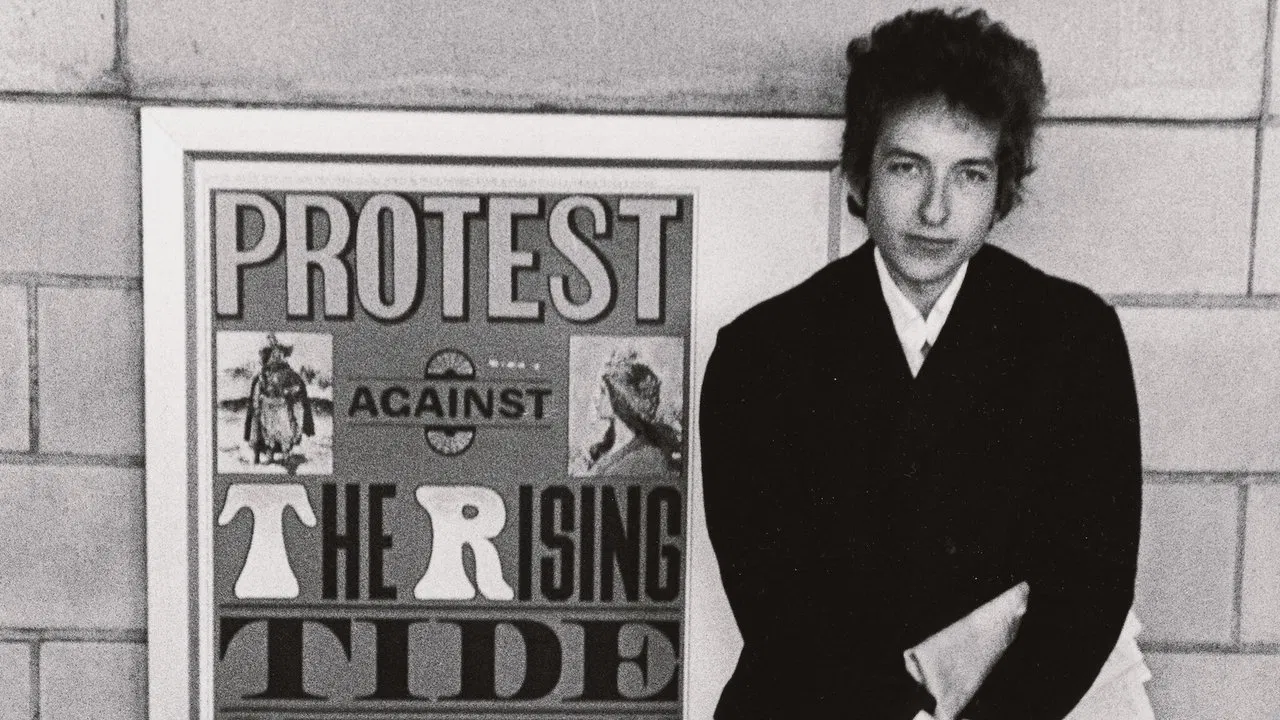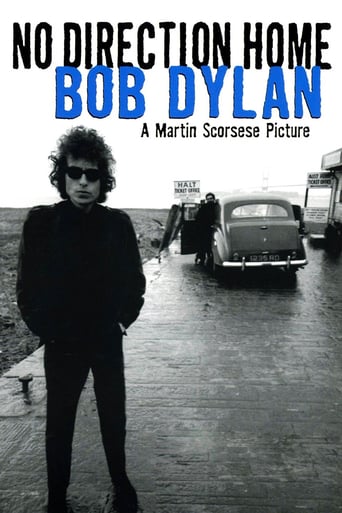

Bob Dylan was a musician of my own time. I always thought him to be a leader of the protest movement. This documentary sets that wrong notion right. Dylan, while a innovate musician, comes across as a anti-social slob who can't seem to give a civilized answer to any question put to him by the press at any time. While I realize that the press can be very trying at times, it is they who help an artist to be better understood by fans. Bob Dylan would have none of it. He presents himself as a stark, self-aggrandizing, egocentric artist who, after being championed early on by Joan Baez, refused to reciprocate the favor and invite her to sing with him on stage, as she had so nobly done for him. Dylan's music is moving, but I found Joan Baez's music to be much more so. See this documentary only if you want to see Dylan as a bad behavior boy.
... View MoreBob Dylan is one of the most enigmatic figures in the history of music and this is a great paradox, as he is also one of the most filmed if not the most filmed performer of the recent decades. Martin Scorsese's three hours plus documentary could not have been possible without extensive filming of events like the Newport festival of jazz in 1963 or the earlier documentary film of D.A. Pennebaker on his 1966 tour in Great Britain. We can see in this film several versions of some of his famous songs like 'Hard Rain' or 'Blowing in the Wind'. And yet, despite all this filmed material Dylan intentionally or not keeps an aura of secrecy around his person. Even the interviews seem more destined to build his image than to explain.Explaining a great artist like Dylan is futile, and Scorsese knows it. He does however help is immensely to understand, feel and love the artist, by bringing alive a lot of sounds and images of the music played in the formative years of Dylan. He takes us by hand and immerses us in the American music and arts scene of the beginning of the 60s. His interviews with people who lived the birth and development of this great talent, and the later interviews with Dylan himself fill in the shining and deep puzzle of this complex individual and creator. His evolution from simple and sensible folks to complex rock and his refusal to enroll in politics by selecting the option to speak his mind only through the language of art become life on screen. The pieces of music we hear are better in the timed recordings than in studio versions. The way the film is made it feels never too long, it never bores, on the contrary it takes us in the universe of one of the greatest artists of our time - and we should be thankful to one of the greatest film-makers of our time for having made this film.
... View MorePeople ask, but why did they boo when Bob Dylan started playing electric guitar? Surely it wasn't THAT big a deal??I was alive then. Believe me, it was. People got VERY upset about it. I think it was something to do with investing so heavily, in an emotional way, with his folk persona. He symbolised every teenager's dream of righteous rebellion. Audiences were far less fragmented in those days. People staked a lot on believing in him (or rather, believing what they wanted his lyrics to mean). You could cut the air with a knife when you asked someone, "if they liked his electric stuff".Bob Dylan reached the height of his fame after three or four albums of (largely) protest songs. He accompanied himself on nothing more than an acoustic guitar and harmonica. Some were simple stories. Some were deep reflections on man's inhumanity to man. He's had no singing training and his voice was rough. But his lyrics captured the imagination of a generation. It was the time of mass protests against the Vietnam war. The Beatles. The Rolling Stones. Boys wearing their hair long was an act of defiance. Revulsion against the values of their fathers, against a world 'gone wrong'. When I took a Bob Dylan record home, my father told me, "Get that music out of this house!"The only problem from Dylan's point of view was, he wasn't into being a figurehead for the antiwar movement or anything else. He just wanted to write his poetry. And sing. It's all he did. Many organisations were already on knife-edge over his refusal to 'lead the parade'. Dylan just kept on writing. Albums went platinum. And Dylan kept on writing.One day he put some of the new poems to music with electric guitars and a backing band. In retrospect, they are easily seen as the same kinda stuff. More sophisticated maybe, but still protestin'. Yet his fans didn't see it like that. The wandering minstrel image was gone. He looked not like a humble folk artist but like a rock star. It all aroused incredible animosity, especially when the technical limitations of some of the sound sets meant people couldn't hear the lyrics properly.Dylan didn't believe in pandering to his audience, although at one point he observes that he can't get in tune if they're booing. There is a concert where they boo continuously (Why did they buy tickets? he wonders . . . But with no thought of going backwards). The only break in the crowd's response is when he plays a song they recognise cos it happens to be near the top of the charts.These were kids that really listened to his lyrics. He could fill the Albert Hall and well-behaved, thoughtful teenagers had sat in rapt attention as he intoned Masters of War or Blowin' in the Wind. They wanted his poetry. But more than that, they wanted a hero. When he 'went electric', the volume seemed to crash through the genteel folk stage like a blasphemous typhoon wind. No Direction home is no idealised portrait of Dylan. Meandering through several hours of archive footage, interviews and concerts, Scorsese presents him not as a hero but as a man. The sound quality on some of the electric sets really is abominable. The pre-fame Dylan is accused of stealing some rare records and of telling lies if it was necessary to get on. But this seemingly rambling biopic eventually drives home a point that baffled his audiences at the time: Dylan, in all his guises, just wrote poetry. If people used it for anything else that was up to them.No Direction Home is not the gripping viewing you might expect for a portrait of one of the most famous recording artists of all time. But it gets to the heart of the man in a way that even Dylan's own (much later) autobiography hardly got to. For those who have read the biography, those early years are beautifully sketched out in the film. Kerouac, Alan Ginsberg, even Woody Guthrie. Talking heads include Joan Baez giving her recollections, and the old man himself, looking back on his early rise to fame with an openness that few have witnessed before. It is a very different film from Pennebaker's Don't Look Back. A more complex portrait than the earlier film set out to achieve, No Direction Home is Bob Dylan deconstructed.One day someone will make a fictionalised movie of Bob Dylan. And Scorsese's documentary film will be a major historical resource.
... View MoreAs odd as this may sound, I first saw this movie in a class I'm taking in college called Bob Dylan: The Man and His Music. It was the first time the class was ever offered--at least where I go to school. I had been unfamiliar with Dylan up until this point, other than hearing his name now and then. Now that I'm taking the class, I have so much more knowledge, appreciation, and respect for who he is and what he does. "No Direction Home" is a major contributor to this class, and while we only watched clips every now and then, we saw a good portion of the entire film. It's possibly one of the (if not THE) greatest documentaries of all time. Scorsese does an incredible job at getting into Dylan's head to show us exactly what he has experienced throughout his extensive career. The interviews with his colleagues along with the combination of concert footage, and a present-day interview with Bob himself makes this an amazing film. We see his evolution from folk to rock and roll, and all the trials and tribulations along the way. ****SPOILERS FOLLOW*** As with any movie, I had my favorite parts. His 1965 interviews were absolutely hilarious. He has such a wit about him that makes you kind of think, 'wow, what a bastard', but then you say, 'wow, what a genius' at the same time. It's kind of hard to explain if you haven't seen it. Also, I believe it's the last performance on the film, where he plays "Like A Rolling Stone" and fans are booing him--one goes so far as to yell out "Judas!" His reaction is incredible. "I don't believe you." "You're liars!" And then he turns to his band and says the greatest thing he could have possibly said at that moment: "Play it f---ing loud!" Genius. Pure genius.
... View More